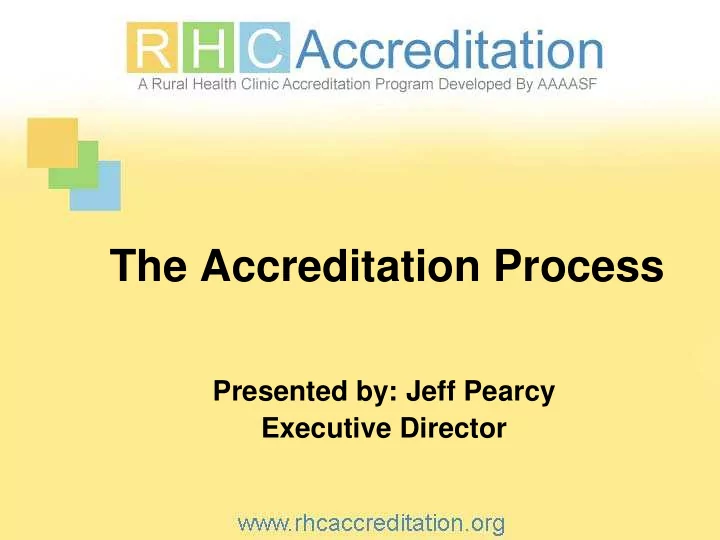

The Accreditation Process Presented by: Jeff Pearcy Executive Director
About AAAASF • Established in 1980 • Peer based survey process • Educational not punitive • 100% compliance with standards • Medicare deeming authority for ASC since 1998 • Informed by CMS of gap in accreditation for additional programs – Approved - Outpatient Physical Therapy, April 2011 – Approved - RHC, March 2012
Why AAAASF? • CMS informed AAAASF that RHC and OPT were underserved provider populations • History of responsiveness to provider communities • Ability to assist facilities in the certification process • AAAASF engaged the RHC community and subject matter experts to develop familiarity with the program – Similar to AAAASF’s growth from Plastic Surgery to other specialties, Oral Surgery, and Rehabilitation • We certainly still have things to learn about RHC
Responsive
RHC Application Downloads n=103 NH WA ME MT VT ND MN OR MA ID WI NY SD WY MI RI PA IA CT NE OH NJ DC NV IN UT IL CA CO WV DE VA KS MO KY MD NC TN OK AZ NM AR SC GA AL MS TX LA AK FL HI PR VI
CMS Deeming Process • Criteria to demonstrate ability to Accredit RHCs – Satisfactory surveyor training program – Accredit clinics via quality surveys – Adequate capacity to administer the program – Crosswalk standards with conditions of coverage • Current standards directly reflect the CMS CFCs – Aim to evolve thru partnership with RHC community
About RHC Accreditation • Peer-based voluntary survey process – Some states may no longer survey • Facilitates enrollment in the Medicare RHC program • Process may replace routine state certification surveys • States will continue CMS Validation and Compliant surveys • States that license RHCs will decide whether to accept Accreditation for licensure – Several states accept accreditation for ASC licensure
About RHC Accreditation • 3 Year Accreditation Cycle – Initial On-site Survey – 2 nd Year and 3 rd Year Self Evaluation – On-site Re-Certification Survey • No reciprocal surveys • No concurrent surveys
Why Choose Accreditation? • New RHCs able to more quickly enroll in CMS program • Growing emphasis on accountability • Self-regulation reduces the need for government regulation • Data indicates accreditation improved outcomes • Better informed patients demand higher standards of care • Existing RHCs can also realize the quality and patient safety benefits of accreditation
Quicker Enrollment Application to Accreditation in Days 241 + 211-240 181-210 151-180 121-150 91-120 61-90 31-60 one day to 30 0 2 4 6 8 10 12 14 16 18 number of facilties
Why RHC Accreditation? • Responsive • Peer based • Timely • Consistent Standards • Focus on Patient Safety • Through NARHC – opportunity to shape the standards • Personal attention and support
Accreditation Assistance
CMS RHC Enrollment Process • Determine site eligibility (state agency) – Non-urbanized area – Health care shortage area • Evaluate financial feasibility of RHC status • File RHC application and CMS provider enrollment (855A) • AAAASF survey and recommendation • File projected cost report – Accreditation is a reportable cost!
Accreditation Process • Download application from WEB • Submit application • AAAASF staff review Pre-Survey materials • Secure Surveyor(s) • Survey – Meet with key staff – Walk through the facility – Review files – Interview key staff – Summation conference • Submit report within 48 hours • Correct deficiencies with AAAASF office • Confer accreditation and recommend deeming
Survey Report Processing • RHC accreditation staff – Review the detailed survey report – Notify clinic of results within 10 business days – Send statement of deficiency report, noting all cited deficiencies to the clinic with instructions for submitting a plan of correction within 10 calendar days to the accreditation office • Surveyor/s may review the clinic’s plan of correction • Issue letter of congratulations and certificate • Notify federal and state agencies of decision
Standards Organization • 100 PURPOSE AND SCOPE • 200 DEFINITIONS • 300 CERTIFICATION PROCEDURES • 400 COMPLIANCE WITH FEDERAL, STATE, AND LOCAL LAWS • 500 LOCATION OF CLINIC • 600 PHYSICAL PLANT AND ENVIRONMENT • 700 ORGANIZATIONAL STRUCTURE • 800 STAFFING AND STAFF RESPONSIBILTIES • 900 PROVISION OF SERVICES • 1000 PATIENT HEALTH RECORDS • 1100 PROGRAM EVALUATION
Accreditation Costs • < 2 FTE - $1,655 annual fee • 2-4 FTE - $2,095 annual fee • > 4 FTE - $4,000 annual fee • 10% discount on annual fees for NARHC members • Every 3 years – Survey fee - $1,400 • Facilities contract for 3 year cycle
Partnership with the RHC Community • Program evolution through experience • Feedback is encouraged • Surveyor and clinic accreditation experience will help shape Standards • Surveys can be stressful, accreditation is designed to be educational and not punitive • Accreditation staff provide exemplary customer service in assisting facilities achieve compliance
Value of Accreditation • AAAASF strives to perform unbiased, fair evaluations • Peer based surveys and uniform training result in consistent application of standards nationally • Clinician surveyors provide exceptional sensitivity to the challenges with compliance – Surveyors may make suggestions for improvement – Clinic director must determine how to achieve compliance • Plans of correction reviewed by surveyor(s) and approved by the RHC Accreditation Committee Chair
About RHC Participation • No method for terminating existing RHCs from the program for losing non-urban status • Provider-based ownership must be clearly evident • Staff includes – One or more physicians (present at least once every 2 weeks) – One or more physician’s assistants, nurse practitioners, or certified nurse midwives (available at least 60% of the time)
Need more help? • Director of Accreditation – Pamela Baker • Jeff Pearcy 262-424-0950
Recommend
More recommend